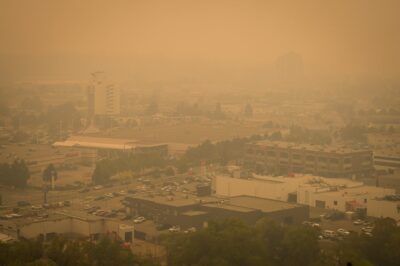Study estimates 2023 Canadian wildfire smoke caused more than 80,000 deaths globally
By Canadian Press on September 10, 2025.

VANCOUVER — A peer-reviewed study says smoke from record-breaking Canadian wildfires in 2023 caused an estimated 5,400 acute deaths and about 82,100 premature deaths worldwide.
The study published in the journal Nature acknowledges some variation in mortality estimates depending on the methods used, but says its overall conclusion is the smoke led to an “enormous and far-reaching” health burden.
Canadian co-author Michael Brauer says the findings serve as a “wake-up call” for areas that haven’t typically seen repeated or prolonged exposure to wildfire smoke, as the health impacts will only increase with worsening climate change.
The researchers used several computer models and data sources to estimate the number of deaths attributable to the particulate pollution, known as PM2.5, from Canada’s worst-ever wildfire season.
The paper says that of the estimated 82,100 premature deaths due to continuous exposure to the smoke over several months, 64,300 occurred in North America and Europe, including 33,000 deaths in the United States and 8,300 in Canada.
Brauer, a professor in the School of Population and Public Health at the University of British Columbia, says wildfire smoke interacts with pre-existing conditions such as heart or lung disease to potentially contribute to an earlier death.
The period between June 26 and July 7, 2023, was especially smoky, causing an estimated 5,400 acute deaths in the United States and Canada.
The 2023 fire season shattered records, with more than 6,000 fires scorching 150,000 square kilometres, according to Natural Resources Canada, while this year is the second-worst season on record, burning more than 83,000 square kilometres.
The health impacts of smoke will increase as severe wildfire seasons become more frequent, says Brauer, whose co-authors were scientists in China and the United States.
“We’re seeing, with a warmer climate, that we’re getting kind of record or close-to-record fire seasons repeatedly every summer,” he says.
“That’s going to contribute to increased numbers of people dying prematurely.”
The study says the wildfires in Canada accounted for 13 per cent of global fire-related exposure to fine particulate matter in 2023, but the Canadian blazes had an outsized impact as smoke spread across North America and western Europe.
The smoke that ended up in parts of Europe wasn’t highly concentrated, but it affected areas with high population density, Brauer says.
While smoke from wildfires in Canada’s vast forests has caused health impacts across continents, Brauer says the greenhouse gas emissions driving climate change and its impacts, including severe wildfires, are a global problem.
This report by The Canadian Press was first published Sept. 10, 2025.
Brenna Owen, The Canadian Press
19-18




